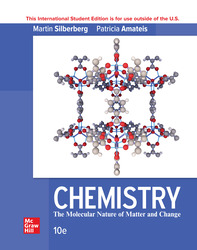At a Glance
Institution:
University of New Brunswick
Instructor:
Dr. Val Reeves
Course Name:
General Chemistry I and II
Resource in Use:
ALEKS 360 - Adaptive Modules and Algorithmic Quizzes
Course Material in Use:

Silberberg, Chemistry: The Molecular Nature of Matter and Change, 10e
Course Type:
Face-to-face
Integration:
Sakai
Course Enrollment:
300-400
In today's fast-paced educational environment, meeting students at their individual learning levels while ensuring they grasp foundational concepts can be a challenging task for instructors. Dr. Val Reeves was no stranger to these hurdles. With large class sizes and students struggling to find the time for practice, she sought a more effective solution to support her students' success in General Chemistry. In her search, Dr. Reeves found ALEKS, a dynamic, adaptive learning tool that promised to address the diverse needs of her students. This is the story of her journey—from facing challenges in her classroom to discovering how ALEKS empowered her students and transformed their learning experience.
The Challenge - Meeting Students Where They Are To Help Them Succeed:
To describe the challenges that she was facing prior to using ALEKS, Dr. Val Reeves shared:
Students complaining that they don’t have time to do practice questions has always been an issue. Having such large class sizes meant that paper assignments were just not feasible. Other platforms that I had used in the past were not adaptive and one size does not fit all when it comes to learning chemistry. I was looking for something different, and the McGraw Hill representative was very keen and passionate about ALEKS. He was also patient with me and let me come to the decision myself.
The Pilot - Taking The First Step:
In Fall 2023, Dr. Reeves decided to pilot the ALEKS resources in her General Chemistry I class alongside her existing digital solution; students used both platforms that term. Setting up her ALEKS course, she was impressed:
It was very easy! The support from McGraw Hill was tremendous and they literally walked me through everything. It is really great to set the modules up ahead of the semester so that you can just let it roll once classes start. There have been way fewer technological issues with ALEKS than I have experienced with other platforms in the past, so student emails about those types of issues have dropped significantly.
After a few weeks, students were given the option to continue using ALEKS for the remainder of the term, and 94.8% of the 306 students surveyed chose to continue with ALEKS. Dr. Reeves continued to share that:
Students found it much more user-friendly and that they were understanding the material a bit easier through ALEKS.
The Implementation - Full Steam Ahead:
With the added confidence from the pilot and improved student experience, Dr. Reeves fully committed to using ALEKS exclusively in both her General Chemistry I and II courses. She uses ALEKS modules and quizzes totaling 20% of students’ final grades.
More than 90% of students opt in to the ALEKS assignments! I have a module for each new chapter (using the Silberberg text, which I LOVE for the end-of-chapter practice tests, questions, and other resources). I also have a weekly short quiz, just to keep the students going. I am thoroughly impressed by the breadth of options within ALEKS, such as quizzes, homework, and modules.
I tell students I will drop their worst module (which are completion-based) and their worst two quizzes, which gives them incentive to keep at it even if they miss a quiz, for example. I also learned years ago that I prefer to use these tools in a more ‘teaching’ style rather than assessment style. So, that means, to me, to offer more than one attempt on quizzes, to allow ALEKS to provide the feedback and worked solutions. I am seeing more students achieving higher grades, and unfortunately, the majority of students who failed the first test are not using ALEKS.
The Results - Meaningful Practice, Student Engagement, and Insights:
What are your students telling you about ALEKS?
Most students like ALEKS and compare it to platforms used in other courses and say that it is laid out better than those and easier to use. They often comment that they found ALEKS frustrating at first because they would get two checkmarks and only need one more to complete a topic in a module, but then they would make a silly mistake and go back to zero and have to start the topic over again. But then they start paying better attention and start getting through topics more easily/efficiently. They seem to find it satisfying to complete modules and it’s almost like the modules are gamified, in that they have to get three correct answers in a row.
How has ALEKS contributed to greater student success?
I like the adaptive nature of ALEKS! The initial knowledge check shows students that they don’t know everything there is to know! That might sound a bit mean, but my intent is that students see that they still have some learning to accomplish, and that’s a good thing. They panic when their score is low on this piece, but then you explain that it typically is, and that it just shows there is a lot they can learn by taking the course.
As they work through the adaptive modules, students who are less prepared are presented with a bit more work, but it’s adapted to help them progress at a pace and level that works for them. Most students end up liking this. I think the modules are the bread and butter of ALEKS and would not recommend running a course without them. I am also seeing a lot of value in the weekly quizzes, as they are keeping students more on their toes, keeping them more engaged with the material.
How does ALEKS help you support your students’ learning?
I really like the reports. You can mine any data you want to, but it’s particularly useful to see what questions students are struggling with, where they are spending a lot of their time, and so on. Since using ALEKS, I’m also getting far less emails from students about how to register or how to use the technology. The time I’m getting back not having to answer these types of questions lets me focus on teaching!
Instructor Profile
Dr. Val Reeves is a Teaching Professor, Director of Undergraduate Studies, and Academic Advisor with the Department of Chemistry at the University of New Brunswick.
I fell in love with teaching chemistry, or rather with trying to make chemistry more accessible to more students and more exciting for students, over 20 years ago. It was completely unexpected, as teaching was never even a thought for me. And I am so grateful to have found this passion. Making chemistry more accessible has been one of my main goals and will continue to be a top priority for me for the rest of my career. When I am not teaching chemistry or thinking about teaching chemistry, I am mama to two amazing teenagers, which really means that I am their chef, chauffeur and cheerleader. I take care of my own chemistry by hitting the trails with my dogs, on my bike or cross-country skiing.


Recommendations from Dr. Reeves
“The single biggest reason I recommend ALEKS is that student confidence with material is improved by using it.”
"Use the reports and support! They are so helpful"
"Be patient and help students be patient. They might complain at first, but once they become accustomed to the program, they will actually really like it! It just takes a few weeks to adjust!"
